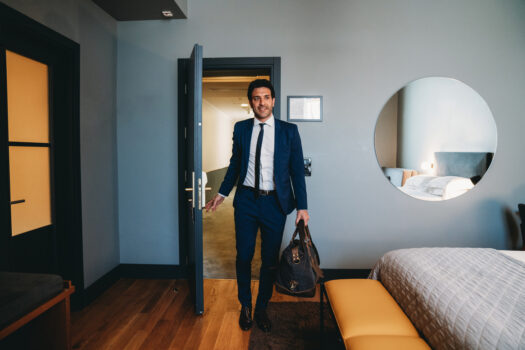When Airbnb first started, nobody thought the company would outcompete the hotel industry. Airbnb founders once said, “We’re not really replacing hotels,” and hotel chain CEOs believed them. However, the data says otherwise.
In the beginning, alternative lodgings accounted for 10% of the industry. In 2021, the alternative lodging sector took a 20% share of the $300 billion global lodging revenue or 36.06% of the accommodations market in North America.
The alternative accommodations sector has experienced a 45% rise in revenue per available room (RevPAR), compared to traditional hotels which have seen a 7.6% growth. This significant difference in performance suggests that the alternative accommodations sector will continue to disrupt the broader hotel industry economically, socially, and culturally for years to come.
The Alternative Lodging Industry At A Glance
Alternative accommodations are those that fall outside the formal or organized lodging sector. They include short-term rentals like, bed-and-breakfast lodgings, vacation rentals, and homestays. Companies like Airbnb and HomeToGo popularized the idea of ordinary people renting out their houses to make money. Now, thanks to them, the alternative accommodations industry has exploded.
On the other hand, STRs are the biggest threat to the hotel industry by far. Partly driven by a shift in consumer behavior and growth in the “sharing economy,” companies like Airbnb, HomeAway, and Vrbo have become a primary accommodation option rather than an alternative.
Even traditional hotel turf, such as corporate and family vacationers, are now increasingly opting for short-term rentals as people continue to look for more flexible accommodation options.
A report by Boston University describes the societal trends behind the rise of alternative accommodations:
● Beyond luxury: travelers are seeking authentic experiences that go beyond mindless, decadent luxury
● Increased access and mobility: alternative accommodations are cheaper and more flexible, allowing previously underrepresented groups to travel more
● Post-consumerism: society has changed its perception of consumption to be more than material wealth, instead focusing on personal improvement and well-being as well as sustainability

● Changing brand relationships: the new generation of consumers values personal, instant gratification above long-term brand relationships
● Bundled experiences (a co-everything world): travelers get to live, work, and play outside of the traditional constraints of a hotel experience
The new generation of travelers are willing to stay in minimalist guest rooms in exchange for easy access to popular local bars, cafés, gyms, communal social spaces, and workspaces. Many hotels have realized this and are shifting their offerings and marketing this new paradigm, but they’re a decade too late.
How Alternative Accommodations Became So Popular
Everyone dismissed Airbnb when it first started. The company almost didn’t take off because investors brushed them of claiming others tried the same idea and failed. Yet, the power of Airbnb and similar companies wasn’t in the idea itself but in its implementation.
Airbnb was created with a firm understanding of what users wanted from the start and was designed to provide a highly targeted consumer experience. Co-founder Paul Graham insisted on this from the beginning, saying “You’ve got to go to your users.”
From their user research, the founders found that a sense of community, serendipity, personalization, and ethical consumerism was the most important elements the new generation of travelers wanted. With the help of the global recession of 2008, they worked this into their marketing and grew rapidly from humble beginnings.
Tying all these efforts together was a genius use of technological advancements such as mobile applications to quickly grow their user base.
By making access free for both guests and hosts, Airbnb mobilized users quickly and easily. They added new features such as special host-led activities, including fitness classes and concerts. No hotel at the time could compete with such levels of convenience, affordability, personalization, and unique local “feel.”
If You Can't Beat Them, Mimic Them
Five years after its humble beginnings, Airbnb brought in $250 million in revenue. In 2015, several CEOs of some of the biggest hotel chains visited Airbnb headquarters for a “day of immersion,” showing they still considered the company a friendly contender rather than a serious competitor.

By 2016, Airbnb’s revenue had risen to $1.65 billion. The Marriott CEO at the time, Arne Sorenson, admitted that this competition is one “which we’d be silly to take for granted.” That year, the American Hotel and Lodging Association tried to lobby for stricter regulations against short-term rentals.
More research reveals that in the 10 US cities where Airbnb has the largest market share, hotels suffered 1.3% fewer bookings and 1.5% less revenue. Boston University suggests that in the 10-year period between 2008 and 2017, growth in Airbnb bookings reduced hotels’ revenue per available room (RevPAR) by 2%.
In other words, the hotel industry was right to get frosty about alternative accommodation. Even the luxury hotel segment was hit hard, with a 4% decline in RevPAR that same year while Airbnb continued to grow 100% year on year.
As of 2022, Airbnb has reached a record revenue of $8.4 billion, which represents a 46% growth year over year (YoY). This is despite tough regulations that are starting to trickle in, with cities like NYC and San Francisco banning the listing of unhosted short-term rentals. In a way, the hoteliers got their wish, but they’re likely to have better luck mimicking Airbnb’s business model.
Hotelier's Response to Alternative Accommodations
In 2016, AccorHotels acquired two startups offering a “home-meets-hotel” kind of experience aimed at tapping into the home-sharing movement that powers STRs. One of these was Onefinestay, which provides high-end hotel services in luxury homes.
More importantly, hotels are looking to tap into the unique personalization and individualism that STRs offer. Where hotel chains historically thrived on consistency and uniformity, some are now working to provide bespoke experiences to suit travelers’ needs.
The Radisson Group provides a great family experience by allowing guests to choose what kind of room they want, such as one with baby cribs (Radisson) or rooms with bunk beds for those traveling with young children.
For others, it’s about providing tailored vacations with a more local feel, such as the Giraffe Manor’s “Safari Experience” or the “24 hours in Lausanne” experience.
Innovations that focus on providing a better customer experience can also help give hotels an edge. Some include smartphone room keys and interactive screens in lobbies that allow digital self check-in.
These are an important start, but hardly enough to compete with the personality of STRs. Welcoming customers with Earl Grey or custom notes is an unforgettable experience, but it would be better to let them define and create their dream travel experience. Instead, hotels may be better served by embracing their superpower: the personal, human-centered interaction that lies at the heart of the entire hospitality industry
Alternative Accommodations Have Their Share of Hurdles
Cities like New York and San Francisco have since banned STRs, and it’s clear that the challenge of alternative accommodation extends far beyond the traditional hotel industry. State and city governments are complaining of reduced housing inventory, but there are more serious risks associated with unregulated STRs.
Some of the most common issues are safety concerns. Numerous reports of assaults and even murders are happening in alternative lodgings because there’s virtually no oversight. Companies managing these platforms are not held directly responsible, so they have low incentive to work on vetting guests and hosts to improve safety.
Parking has also become a big problem for STRs. States like Rhode Island and California are required to institute zoning laws and limit on-site parking. In addition, Mill Valley in California now requires STR hosts to get registered as a business and pay a 10% tax on total turnover.
Such regulations and constraints are likely to continue as local authorities come to terms with the cultural and social effects of alternative accommodations, particularly STRs such as Airbnb, HomeToGo, and Vrbo.
Adapting To The Times
The alternative lodging industry has no doubt woke up the hotel industry to the realities of change. It’s important to adapt to changing consumer needs and expectations to help your hotel business survive these unpredictable times.
NewGen Advisory’s team of veteran hotel industry consultants and advisors are here to help you find and implement the right innovations for your hotel. Talk to us today and we’ll help you conquer the accommodation industry, alternative lodgings and STRs notwithstanding.


